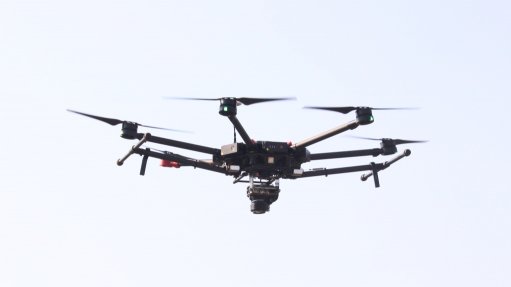
EYE IN THE SKY
A RPAS similar to this could potentially be used to monitor criminal activity with visual and thermal imaging as a potential monitoring solution
Photo by: Dylan Slater
Theft at Anglo American Platinum’s (Amplats’) Amandelbult complex, in Thabazimbi, Limpopo, is a major issue for the mining house, which is weighing up the benefits of employing a sophisticated drones solution to detect and deter criminal activity.
On average, theft within the Amandelbult complex amounted to about R17-million a month, said Anglo American divisional surveyor Donovan Andersen during the first edition of the drone conference and exhibition, Drone Con 2017, held in Johan- nesburg, earlier this month.
The professional industry term for a drone is ‘a remotely piloted aircraft system’, or RPAS.
Drone Con 2017 focused on delving into major issues the domestic RPAS industry is faced with, with a secondary focus on how such systems are being incorporated into mining operations throughout the country.
Andersen pointed out that, owing to the significant financial loss incurred as a result of theft within the Amandelbult complex, the cost recovery of implementing an expensive RPAS security solution would be “instantaneous”.
Amplats has yet to implement the RPAS solution, but Andersen said the miner was investigating different types of RPAS solutions to meet the specific security requirements of Amandelbult.
Andersen said the likely RPAS solution would need to be operated beyond the visual line of sight and at night (when a lot of security issues arise), and would need to be flown at increased elevation, above the legal RPAS-restricted elevation of 121 m above ground level. The higher-than-normal elevation would be necessary as thieves attempt to bring down any RPAS flying close enough.
These three operational aspects are major issues in terms of legally operating such an RPAS security solution, because they all require specialised authorisation and certification from the South African Civil Aviation Authority, which Amplats would need to acquire if it wanted to implement such a solution.
Although regular RPAS operations still require pilots to be tested and certified, as with their aircraft systems, certain restrictions are in place to govern and regulate most of the industry. For instance, regular certified and authorised RPAS flying cannot exceed an elevation of 121 m above ground level, and RPASes cannot be operated at night and must remain within unaided visual line of sight.